Human Rights Group Says World Reactions Needed To Iran Executions
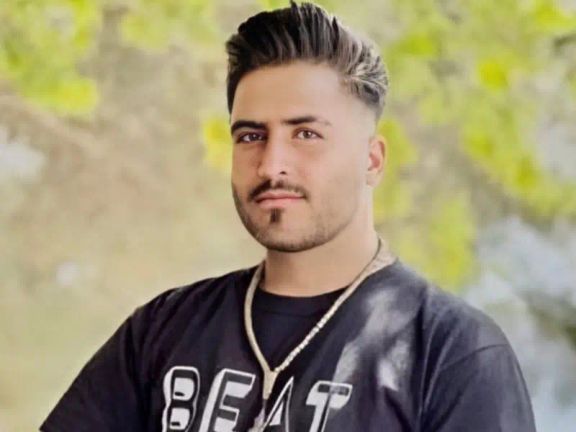
The Human Rights Organization of Iran has raised alarm over the recent execution of Iranian protester, Milad Zohrevand, and its potential repercussions.

The Human Rights Organization of Iran has raised alarm over the recent execution of Iranian protester, Milad Zohrevand, and its potential repercussions.
Director Mahmoud Amiry-Moghaddam emphasized on Friday that the global community's response plays a crucial role in influencing the cost of executions for the Islamic Republic.
Zohrevand, a 20-year-old protester from Malayer in western Iran, was arrested on October 27, 2022, marking the 40-day anniversary of Mahsa Amini's death, which had triggered widespread protests across the country.
He was secretly executed in Hamedan Central Prison on November 22.
The Oslo-based Human Rights Organization of Iran contends that his execution, like those of other protesters, lacked due process and a fair trial, constituting a criminal act. Amiry-Moghaddam held the Islamic Republic authorities accountable, noting that “the international community’s relative silence toward the extraordinary wave of executions over the past months has prompted the Islamic Republic to resume protester executions.”
Expressing grave concern for the lives of numerous protesters currently on death row or awaiting execution in Iranian prisons, the organization warned that an inadequate response to Zohrevand’s execution could lead to more protester hangings.
According to state media, Zohrevand was accused of killing an IRGC officer named Ali Nazari on the day of his arrest. He was sentenced to qisas (retribution-in-kind) for murder, a decision upheld by the Supreme Court on November 15.
Zohrevand becomes the eighth protester associated with the Women, Life, Freedom movement to be executed since December 2022.
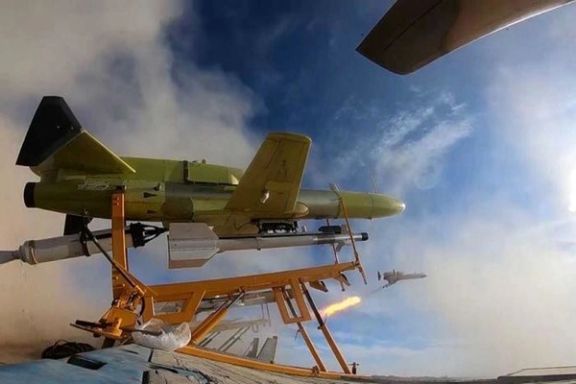
An Israeli commercial ship was reportedly attacked in the Sea of Oman or northern Indian Ocean on Thursday or Friday and caught fire, according to Al Mayadeen TV and a US official.
This is the first time that such an incident has been reported following the seizure of a commercial vessel in the Red Sea by Yemen’s Houthis earlier this week. The Iranian government news agency IRNA and Fars news agency affiliated with the Revolutionary Guard both published identical texts relaying what Al Mayadeen, a network affiliated with Iran has reported.
The Associated Press also quoted an unnamed American official as saying that a suspected Iranian Shahed-136 drone was used to attack the container ship owned by an Israeli billionaire. The report said the incident happened on Friday in international waters.
According to IRNA and Fars, there are no details available. The exact location of the alleged attack in the vast area was also not mentioned. The Sea of Oman lies to the southeastern shores of Iran and straddles its border with Pakistan.
They both also published the same photo with their reports showing a vessel on fire on open seas, but it is not clear if the photo is related to the incident claimed by Al Mayadeen.
Houthis are part of Iran’s network of proxy forces in the region that have launched attacks against Israel since the start of the Gaza war in October.

Iran's interior minister denies having authorized hijab enforcers at the capital’s subway stations, claiming they are “citizens’ groups” carrying out a religious duty.
Photos emerged on social media on Saturday that showed black-veiled women forming a human tunnel, which many now refer to as ‘tunnel of horrors’, at one of Tehran’s main subway stations to make sure women wear proper hijab. Similar surveillance and enforcement have also been reported at other stations.
Since May, the capital’s subway stations have been the battleground of women who are against compulsory hijab and various hijab enforcers as well as some ordinary citizens who consider it their duty to force others to abide by the rules.
The women who wore green shoulder sashes with the words “guidance ambassadors” written on them stopped women who were not wearing headscarves to admonish them for breaking the compulsory hijab rules.
Responding to reporters’ questions on the topic after the weekly cabinet meeting on Wednesday, Interior Minister Ahmad Vahidi declared that citizens’ groups were only carrying out ‘amr-e be marouf' for which everyone is responsible.
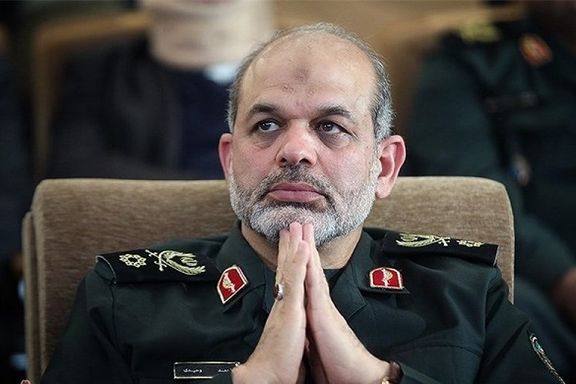
The phrase refers to a pious Muslim’s duty to urge others to avoid forbidden deeds and carry out what conforms with religious rules.
“We have not issued any particular permits for [their work],” Vahidi who is second in command of the police force after Supreme Leader Ali Khamenei, claimed while insisting that that all citizens have a religious duty to carry out ‘amr-e be marouf’ but this can only involve “nicely worded” verbal exhortation.
“Interesting! So, this tunnel of horrors at the metro is a citizens’ [initiative]!” Mostafa Faghihi, the managing director of the moderate conservative Entekhab news website tweeted Wednesday in reaction to Vahidi’s claim.
“Do people also pay their monthly salary? Are they also hired and organized under citizens’ supervision? No authorization required? How democratic and free!” Faghihi wrote referring to reports in August that Tehran municipality was planning to hire 400 uniformed hijab enforcers to deploy at subway stations of the capital.
Speaking to Faraz Daily news website, an official of the Tehran Metro Company had also earlier denied that that hijab enforcers are officially active in Tehran subway. Hadi Zand, head of international affairs and communications of Tehran Metro Company, told Faraz Daily that the company only has uniformed security personnel who are responsible for dealing with various issues including peddlers and ensuring the security of the subway system.
Many, including prominent reformist commentator Abbas Abdi, have raised objections to the deployment of ‘Hijab Patrols’ in Tehran’s subway stations, the police force’s use of CCTV to identify hijab infringers and recording their images.
In a commentary written for the reformist Etemad newspaper Tuesday, Abdi warned the authorities that that measures such as creating hijab enforcers “tunnels” in the subway corridors would only deepen the gap between the people and the authorities and increases public anger and hatred.
He also argued that introducing hijab enforcers as “guidance ambassadors” is unjustified because governments in the modern world are not mandated to guide people and the police is only responsible for establishing order. Hijab enforcers are municipality employees or police who act based on the orders they receive and get paid for their work like other employees, he said.
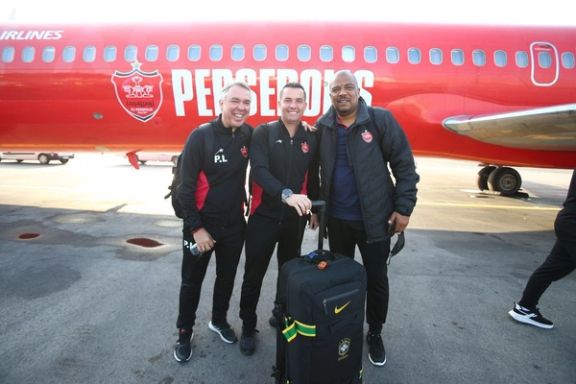
Persepolis football club's charter flight to Riyadh was denied permission from the Riyadh airport due to the airline's links on “military and security institutions," Iran International has learned.
The team was scheduled to departFridaymorning for their match against Al Nassr on Monday as part of the Asian Champions League, but it was announced on the Iranian football club's website that the flight had been canceled.
Lateron Friday, Iranian state news outlets blamed the airline for the cancellation. IRGC-affiliated Fars News reported that “according to Saudi Arabia’s laws, only a few Iranian airlines that usually fly Hajj pilgrims can land at Riyadh airport.”However, this particular airliner, which remains unnamed, was not among the authorized companies.
Moreover, Fars News said it was possible that the flight was chosen because it was “cheaper,” a questionable motive for one of the wealthiest clubs in the country.
According to other sources, Persepolis' private jet, owned by Chabahar Airlines, is barred from entering Saudi Arabia. This restriction is based on a policy prohibiting the entry of aircraft over 25 years old to Jeddah and Riyadh airports.
Several Iranian airlines, including Mahan Air -- affiliated with the Islamic Revolutionary Guard Corps (IRGC), have been banned by countries such as the US and France on the grounds that they transport military equipment and personnel to Syria and other areas in the Middle East.
Relations between Iran and Saudi Arabia have long been strained and this year's Asian football Champions League is the first since 2016 in which clubs from both nations have been permitted to play one another home and away. Matches between clubs from the two nations were previously played on neutral territory due to security concerns.

The UN Special Rapporteur on Iran says the mandate of UN fact-finding mission goes beyond Iran’s human rights violations during 2022 protests crackdown.
In an interview with Iran International, Javaid Rehman revealed that one aspect of the UN's ongoing mission involves looking into the 1980s mass execution of political prisoners as well as minorities' rights.
He said the investigation is not limited to the regime's atrocities committed in the aftermath of Mahsa Amini's death last year that sparked a months-long uprising.
Human Rights Council established a fact-finding mission to investigate alleged violations of human rights in Iran following the mass protests that began in September 2022.
Rehman, in Australia for the first time as UN Special Rapporteur, said Iranian civil societies and dissidents have expressed concerns about the Iranian regime's behavior.Most notably, dissidents are concerned about the possibility that the regime might spy on them and “get revenge” on their families, particularly after taking part in solidarity protests in Australia.
Other countries share the same concern. Global News reported this month that Iranian dissidents in Canada live in fear of imminent harm from agents of the Islamic Republic.
However, Kazem Gharibabadi, the deputy head of the judiciary’s Human Rights Council, said last week that the regime does not recognize the UN’s committee that investigates alleged human rights violations in Iran.
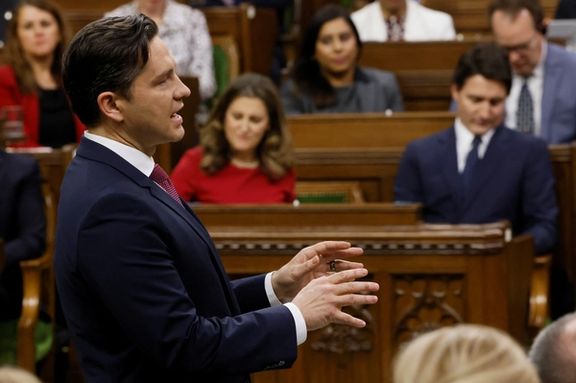
The Canadian opposition leader, running to be the next prime minister, says Iran’s Revolutionary Guards pose the most significant security threat to his country.
Pierre Poilievre, the leader of Canada's Conservative Party, made the remarks on Thursday during a visit to a synagogue in Toronto, outlining his party’s plan for addressing acts of hate crime as well as terrorism and foreign-influence threats.
Dubbing the Islamic Revolutionary Guard Corps (IRGC) as the “most sophisticated, well-financed terror group on Planet Earth,” Poilievre said that the group was behind the October 7 Hamas attack on Israel, and is an ally of Hezbollah, which has been designated in Canada as a terrorist group.
He also cited a recent report as saying that 700 IRGC agents are operating in Canada “with impunity using stolen money, terrorizing the Persian and Jewish populations and putting Canadians at risk on our soil” as well as being involved in financial malfeasance. A Global News investigation earlier in November claimed it has found evidence that Canada has become a safe haven for affiliates of the Islamic Republic, with 700 people identified already and counting.
“It is time that Justin Trudeau stood up to defend our people against these IRGC murderers and terrorists by banning them today. We should work to kick out every single regime, agent, or terrorist that is operating in this country," Poilievre stated.
He also highlighted the 2020 shooting down of a Ukrainian passenger jet by the IRGC, killing 176 people, including 55 Canadian citizens and 30 permanent residents. Flight PS752 was shot down by two air-defense missiles fired by the IRGC shortly after taking off from Tehran's Imam Khomeini International Airport on January 8, 2020.
During his speech, Poilievre presented the Conservative Party's five-point "common sense action plan” to protect citizens from hate-driven crimes, with the primary proposal urging the Canadian government to immediately designate the IRGC as a terrorist organization.
Canada’s federal government has referred to the IRGC as a terrorist organization, described its leadership as terrorists, announced measures to make its senior members inadmissible to Canada, and has listed the outfit’s extraterritorial expeditionary division Quds Force as a terrorist entity. However, despite numerous calls from the federal Conservative party, activists and even US lawmakers as well as the families of victims of the Ukrainian flight, the government has refused to designate the whole entity as a terrorist entity under the country’s Criminal Code. In June, Canada's Senate passed a non-binding motion to designate the the Guards as a terror organization, echoing a similar motion in 2018. The country's Liberals supported the Tory motion in the House of Commons back in 2018, but have not done so since.
Additionally, part of Poilievre's plans involves pushing for the establishment of a centralized hub to register information on individuals collaborating with menacing states and disclosing such details to the public. “We need to establish a Foreign Influence Registry... which requires that anyone who works for a foreign dictatorship register, have their names publicized, and exposed.”
The proposed measures reflect a robust stance by the Conservative Party against the perils posed by the IRGC in Canada, with Poilievre asserting the need for decisive actions to safeguard national security and citizens from potential harm.
Earlier in November, Trudeau reiterated that Canada holds “the Iranian regime responsible for the shooting down of PS752, killing of its own citizens and killing of Canadian citizens, and its sponsorship of terror around the world.” So far, Canada has sanctioned 170 Iranian individuals and 192 Iranian entities, including key IRGC and members of the regime’s security, intelligence and economic apparatuses. In 2012, Canada designated Iran as a state supporter of terrorism under the State Immunity Act.